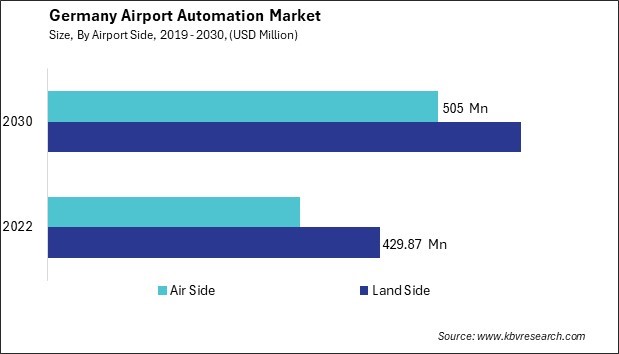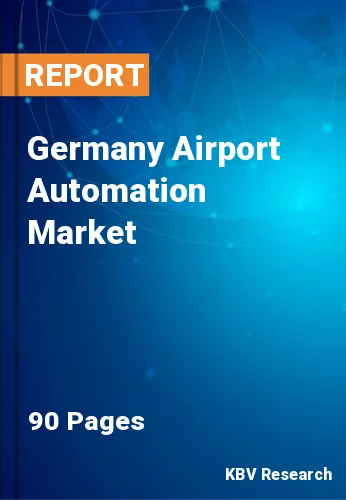The Germany Airport Automation Market size is expected to reach $1.1 Billion by 2030, rising at a market growth of 4.6% CAGR during the forecast period.
The airport automation market in Germany has experienced significant growth in recent years, driven by advancements in technology and increasing demand for efficient airport operations. Germany, one of Europe's busiest travel hubs, has been at the forefront of adopting automation solutions to enhance passenger experience, streamline processes, and improve overall operational efficiency. Moreover, the increasing pressure to reduce costs and enhance revenue generation has prompted airport operators in Germany to invest in automation technologies that help optimize resource allocation, minimize manual intervention, and maximize operational throughput.

One of the key drivers of the airport automation market in Germany is the growing emphasis on enhancing passenger experience. With the increasing number of travelers passing through German airports each year, there is a growing need to reduce wait times, minimize queues, and provide a seamless journey from check-in to boarding. In Germany, the industry for airport automation has seen a significant surge, mirroring the trend witnessed in the hospitality sector.
According to Destatis, a collective total of 38.6 million overnight stays in holiday dwellings and homes were booked via four major online platforms, namely AirBnB, Booking.com, TripAdvisor, and Expedia, representing a remarkable 39.8% increase compared to 2021. This surge parallels the growth observed in airport automation technology, indicating a robust demand for streamlined and efficient processes in both sectors. In 2019, these platforms facilitated 37.2 million overnight stays, showcasing a 3.6% increase in 2022, which aligns with the upward trajectory of adopting airport automation solutions within the German industry.
Furthermore, the German government's focus on modernizing airport infrastructure and improving operational efficiency has fueled the demand for automation solutions. Investments in upgrading airport facilities, including terminal expansions, runway renovations, and the implementation of smart technologies, have created opportunities for automation vendors to provide innovative solutions tailored to the specific needs of German airports.
The COVID-19 pandemic has profoundly impacted the airport automation market in Germany, causing a significant slowdown in air travel and disrupting airport operations. The sudden decline in passenger traffic has forced airports to reevaluate their automation strategies and prioritize solutions that enhance health and safety measures while minimizing human contact. As a result, there has been an increased demand for touchless technologies such as biometric authentication, self-service kiosks, and automated disinfection systems to reduce the risk of virus transmission and restore passenger confidence.
The airport automation market in German airports has witnessed significant growth in response to the increasing air passenger traffic in recent years. As one of Europe's busiest aviation hubs, Germany has been investing in automation technologies to enhance operational efficiency, passenger experience, and overall airport safety. One of the primary drivers of this growth is the rising demand for seamless travel experiences among passengers. With air travel becoming more accessible and affordable, airports in Germany are experiencing a surge in passenger numbers, leading to congestion and operational challenges.
Automation technologies such as self-service check-in kiosks, automated baggage handling systems, and biometric authentication systems are being deployed across German airports to expedite the passenger journey from check-in to boarding. Furthermore, automation is crucial in optimizing airport operations and resource management. Advanced analytics and predictive modeling tools enable airports to anticipate passenger flows better, allocate resources efficiently, and mitigate potential bottlenecks.
Moreover, the adoption of automation technologies in Germany is driven by the need to enhance security measures in response to evolving threats. Advanced screening systems, including automated facial recognition and biometric identification, bolster security protocols while expediting the security screening process for passengers. Hence, the airport automation market in German airports is flourishing, driven by the pursuit of seamless travel experiences and heightened security measures amidst increasing air passenger traffic.
The airport automation market in Germany is experiencing a significant transformation fueled by the rising integration of digital technologies. One prominent trend is the adoption of advanced passenger processing systems. German airports increasingly deploy digital solutions such as self-service check-in kiosks, automated bag drop systems, and biometric authentication technologies to streamline the passenger journey. These technologies enhance operational efficiency and improve the overall passenger experience by reducing wait times and enhancing security measures.
Moreover, integrating artificial intelligence (AI) and machine learning algorithms is revolutionizing airport security. German airports leverage these technologies to analyze vast amounts of real-time data, enabling more accurate threat detection and predictive analytics. AI-powered security screening systems identify suspicious behavior patterns and potential security threats, strengthening airport security measures.
Furthermore, the rise of the Internet of Things (IoT) drives airport infrastructure and facilities management automation. Additionally, the emergence of digital twins is revolutionizing airport design, construction, and maintenance processes in Germany. Digital twin technology enables airport operators to create virtual replicas of physical assets, allowing for real-time monitoring, simulation, and predictive maintenance. Therefore, Germany's airport automation market is undergoing a profound evolution driven by digital technologies like advanced passenger processing and the advent of digital twin technology aimed to optimize operations and enhance passenger experiences.

The airport automation market in Germany is a thriving sector characterized by a robust infrastructure, technological innovation, and a strong focus on efficiency and passenger experience. One of the prominent players in the German airport automation market is Siemens AG, a global leader in electrification, automation, and digitalization solutions. Siemens provides comprehensive automation solutions tailored to the specific needs of airports, including automated baggage handling systems, building management systems, and advanced security technologies. The company's expertise in integrating digital technologies and data analytics enables airports to optimize resource utilization, improve operational efficiency, and enhance overall passenger satisfaction.
Another key player in the airport automation market is Bosch Security Systems GmbH, a subsidiary of Robert Bosch GmbH, specializing in security and communication solutions for various industries, including aviation. Bosch offers a range of airport automation products, such as video surveillance systems, access control systems, and fire detection systems, designed to ensure the safety and security of airport facilities. The company's cutting-edge technologies enable airports to effectively detect and respond to security threats while maintaining seamless operations.
Lufthansa Industry Solutions GmbH & Co. KG (LHIND) is a leading provider of IT consulting and system integration services for the aviation industry. LHIND offers customized automation solutions for airports, including passenger processing systems, baggage handling systems, and airport management platforms. Leveraging its extensive industry experience and technological expertise, LHIND helps airports optimize processes, improve operational performance, and enhance the overall passenger journey.
Furthermore, Materna Information & Communications SE is a significant player in the German airport automation market, specializing in digitalization and automation solutions for airports and airlines. Materna offers a wide range of products and services, including self-service kiosks, biometric authentication systems, and mobile applications, to simplify passenger processes and enhance airport efficiency. The company's focus on innovation and customer-centric solutions has made it a trusted partner for airports seeking to leverage technology to improve passenger experience and operational excellence. With the ongoing digital transformation of the aviation industry and the increasing demand for seamless and efficient airport operations, the airport automation market is expected to continue growing.
By Airport Side
By Automation Level
By System
By End Market
By Application
Our team of dedicated experts can provide you with attractive expansion opportunities for your business.

